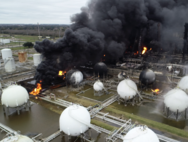Our Network

Coming Clean is a nonprofit environmental health collaborative working to transform the chemical industry so it is no longer a source of harm, and to secure systemic changes that allow a safe chemical and clean energy economy to flourish. Our members are organizations and technical experts — including grassroots activists, community leaders, scientists, health professionals, business leaders, lawyers, and farmworker advocates — committed to principled collaboration to advance a nontoxic, sustainable, and just world for all. Learn more.

Coming Clean and the Environmental Justice Health Alliance for Chemical Policy Reform (EJHA) have worked in strategic partnerships for over 20 years. EJHA is a network of grassroots organizers from communities that are disproportionately impacted by toxic chemicals from legacy contaminations, ongoing exposure to polluting facilities, and health-harming chemicals in household products. Visit their website to learn more.
Our Work

Safe Fields & Food
Protecting farmworkers from harmful chemicals and supporting sustainable local food systems.
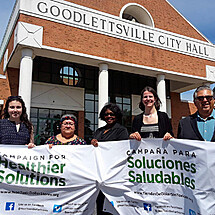
Safe Products & Stores
Defending customers and our families from toxic chemicals in products.
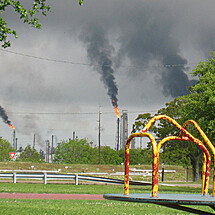
Safe Chemicals & Facilities
Protecting fenceline communities and facility workers from chemical disasters and toxic chemical exposure.
Highlights
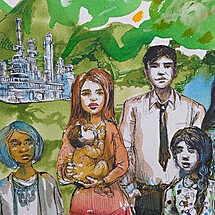
Life at the Fenceline
Watch the video: Roughly 40% of the population live within 3 miles of chemical facilities that could leak, spill, or explode.
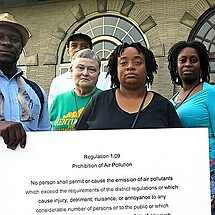
The Louisville Charter
The Louisville Charter for Safer Chemicals is our shared platform for transforming the chemical industry, endorsed by 125+ organizations.
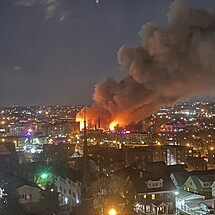
Preventing Chemical Disasters
Watch the video: We're calling on the EPA to strengthen the rules for hazardous facilities.
Latest News
April 16, 2024
EPA Finalizes New Standards for Cancer-Causing Chemicals
Nalleli Hidalgo, a community outreach liaison with Texas Environmental Justice Advocacy Services, attended the signing last week, after meeting with Regan on his listening tour. She told ProPublica she was overwhelmed by the people missing from the room who were not alive to witness this achievement. “We have lost too many loved ones as a result of bureaucratic inertia,” she said, noting that the EPA has long been required by law to update its risk standards for these chemicals. “Our communities should not have to wait one more day for fence line monitoring to take effect.” For years, Texans like Hidalgo, living near chemical plants, have asked the agency to measure what they’re breathing in.
Read MoreApril 14, 2024
New EPA rule to reduce industrial air pollutants leaves out a majority-Black West Virginia community
Last week, Biden administration officials finalized a rule they said would significantly reduce cancer-causing air pollutants, lowering cancer risk and advancing environmental justice goals. But the move by the U.S. Environmental Protection Agency left out a Black West Virginia community yet again. While the rule will target facilities surrounding communities historically overburdened by toxic air pollution, it doesn’t cover the chemical production category that has disproportionately affected one of West Virginia’s only two majority-Black communities. “It’s actually a positive development, but it doesn’t fully address the issues in Institute,” said Maya Nye, a former Kanawha Valley resident and member of the Charleston-based People Concerned About Chemical Safety.
Read MoreApril 9, 2024
Following a generation of grassroots advocacy, EPA takes major steps to reduce cancer-causing emissions from select chemical plants
Today, following years of advocacy from environmental justice organizations, the U.S. Environmental Protection Agency (EPA) finalized a rule to significantly reduce emissions of toxic air pollution from an estimated 200 chemical plants, in an effort to reduce elevated cancer risks experienced by fenceline communities. "It has taken nearly a whole generation of hard work to arrive in DC to make this announcement,” said Nalleli Hidalgo, Education Liaison with Texas Environmental Justice Advocacy Services (tejas), who introduced EPA Administer Michael Regan at today’s White House signing event. “As we take this moment in, we remember that we are not here as individuals but as a community standing in solidarity as we witness a key moment in rulemaking to reduce the daily harm our communities face, especially frontline communities that live directly across from HON facilities.”
Read MoreApril 4, 2024
A new EPA rule is meant to prevent chemical disasters, but safety advocates say loopholes remain
Chemical safety advocates praised the EPA’s new requirements but added that the agency needs to go further, including by adding a notoriously explosive farm fertilizer – ammonium nitrate – to the list of chemicals that should require companies to develop risk management plans. Advocates also say EPA should have included more safety requirements and mandates for air monitoring at the fence lines of major facilities so nearby residents can see what chemicals are being released in real time. “We’ve needed this rule for a long time,” said Maya Nye, executive director of chemical safety advocacy coalition Coming Clean. But she added that “additional measures are needed. Read more in Oil and Gas Watch News.
Read MoreApril 1, 2024
We're hiring an IT Specialist!
Coming Clean is seeking an Information Technology Specialist to provide website and technical support and optimize the IT and related activities and systems for the organization. Top-level duties include administering and troubleshooting the organization’s information technology and systems; providing day-to-day support and problem-solving of IT issues for staff; supporting domain and website management; and training staff on IT systems, programs, and hardware. The Information Technology Specialist is a well-rounded generalist, who is able to competently handle a wide variety of IT related administrative tasks and issues.
Read MoreComing Clean is a nonprofit collaborative of environmental health and environmental justice experts working to reform the chemical and energy industries so they are no longer a source of harm. We coordinate hundreds of organizations and issue experts—including grassroots activists, community leaders, scientists and researchers, business leaders, lawyers, and advocates working to reform the chemical and energy industries. We envision a future where no one’s health is sacrificed by toxic chemical use or energy generation. Guided by the Louisville Charter, Jemez Principles of Democratic Organizing, and the Principles of Environmental Justice, we are winning campaigns for a healthy, just, and sustainable society by growing a stronger and more connected movement.
The Campaign for Healthier Solutions Farmworker Health and Justice Team Chemical Disaster Prevention Program |
© 2024 Coming Clean Inc. | Coming Clean, Inc., 28 Vernon Street, Suite 434, Brattleboro, VT 05301 • (802) 251-0203





